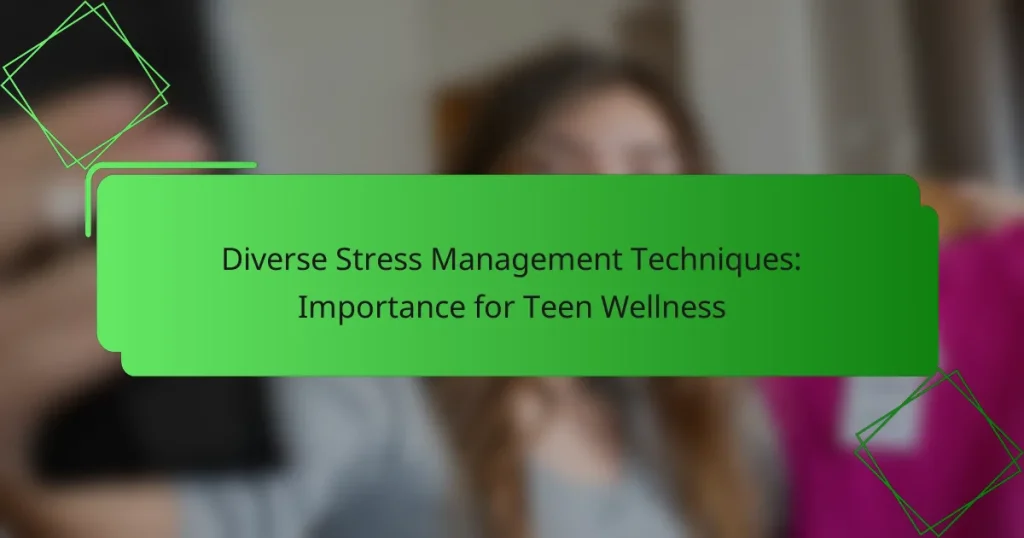Managing stress is crucial for the wellness of teenagers, as it directly impacts their emotional, academic, and physical health. By employing diverse stress management techniques, teens can enhance their emotional resilience and overall well-being. With the help of technology, such as mental health apps and online resources, they can access effective tools to navigate their stressors more effectively.
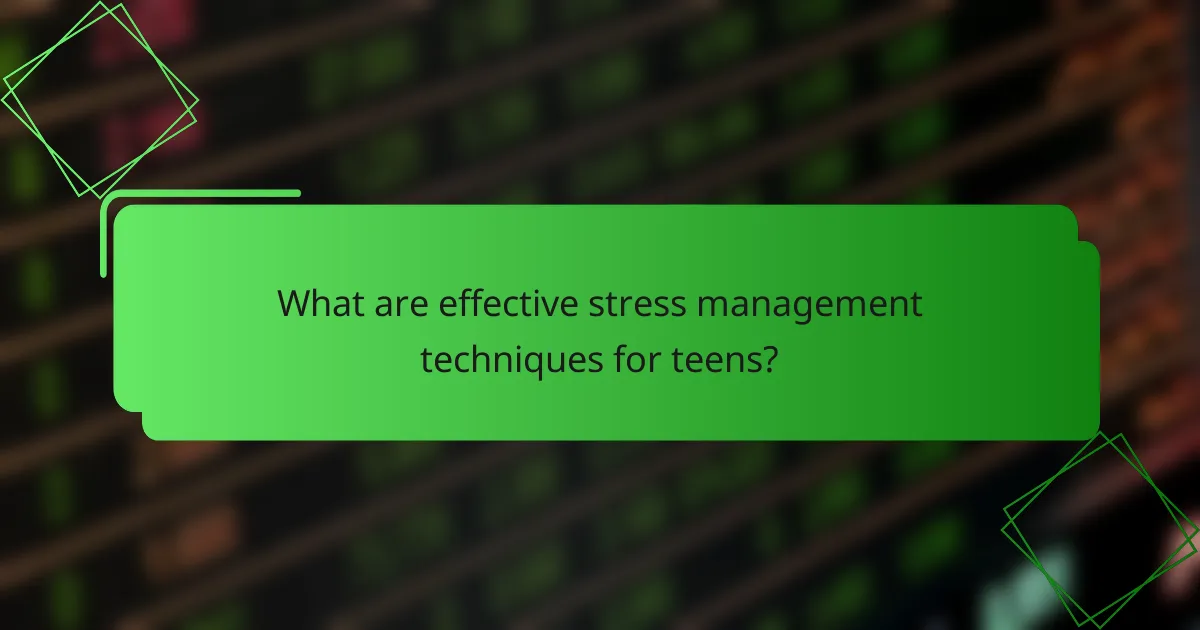
What are effective stress management techniques for teens?
Effective stress management techniques for teens include practices that help them cope with stressors and maintain their mental wellness. These methods can enhance emotional resilience and improve overall well-being.
Mindfulness meditation
Mindfulness meditation involves focusing on the present moment and accepting thoughts and feelings without judgment. This technique can help teens reduce anxiety and improve concentration, making it easier to handle stress. Regular practice, even for just a few minutes daily, can lead to significant improvements in emotional regulation.
To get started, teens can find guided meditation apps or videos that provide structured sessions. It’s beneficial to create a quiet space free from distractions to enhance the experience.
Physical exercise
Physical exercise is a powerful stress reliever for teens, as it releases endorphins that boost mood and reduce feelings of stress. Engaging in activities like running, swimming, or team sports can provide both physical and mental benefits. Aim for at least 30 minutes of moderate exercise most days of the week.
Teens should choose activities they enjoy to make exercise a regular part of their routine. Group activities can also foster social connections, adding another layer of support against stress.
Creative arts therapy
Creative arts therapy includes activities like drawing, painting, music, and dance, which allow teens to express their emotions in a non-verbal way. This form of therapy can be particularly effective for those who find it hard to articulate their feelings. Engaging in creative arts can serve as a healthy outlet for stress and anxiety.
Teens can participate in community art classes or simply explore their creativity at home. Setting aside time each week for creative expression can help maintain emotional balance.
Time management skills
Developing time management skills is crucial for teens to reduce stress related to academic and personal responsibilities. By prioritizing tasks and setting realistic goals, they can avoid last-minute cramming and overwhelming workloads. Tools like planners or digital calendars can help organize their schedules effectively.
Teens should practice breaking larger tasks into smaller, manageable steps and allocate specific times for each. This approach can help them feel more in control and less stressed about deadlines.
Social support networks
Building strong social support networks is vital for teens to cope with stress. Friends, family, and mentors can provide emotional support and practical advice during challenging times. Encouraging open communication within these networks can foster a sense of belonging and reduce feelings of isolation.
Teens should actively engage with their support systems, whether through school clubs, sports teams, or community groups. Regularly spending time with supportive peers can enhance resilience and provide a buffer against stress.
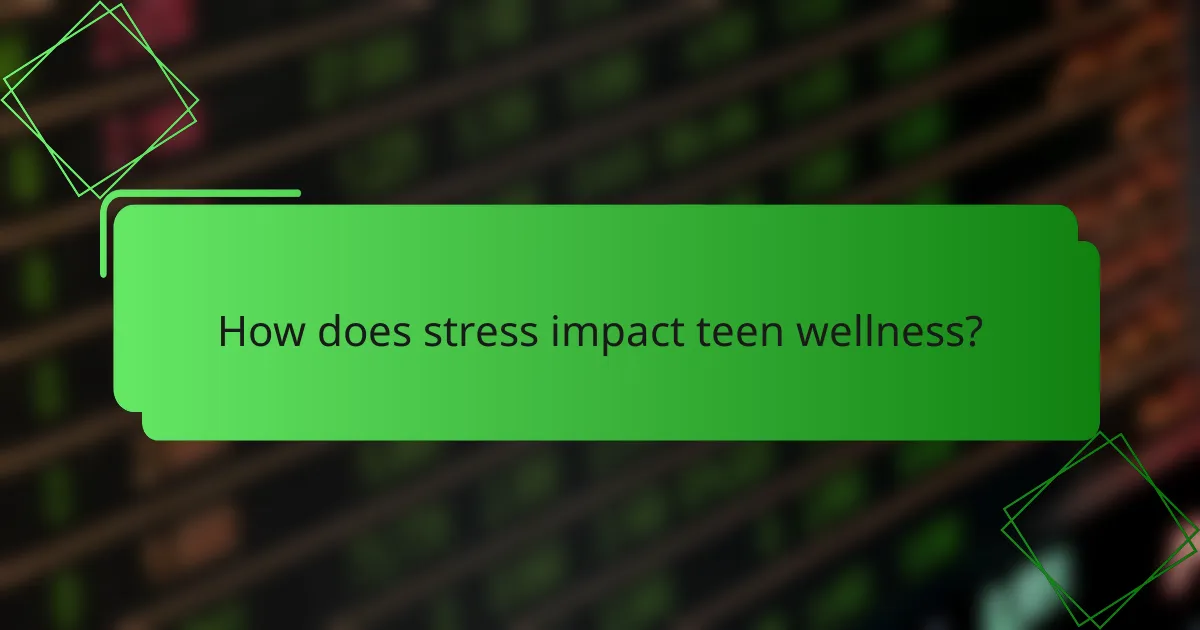
How does stress impact teen wellness?
Stress significantly affects teen wellness by influencing their emotional, academic, and physical health. High levels of stress can lead to various negative outcomes, making it essential for teens to develop effective stress management techniques.
Emotional health decline
Stress can lead to a decline in emotional health among teens, often resulting in anxiety and depression. These emotional challenges can manifest as irritability, mood swings, or withdrawal from social interactions.
Teens experiencing high stress may struggle to manage their emotions effectively, leading to conflicts with peers and family. Encouraging open communication and providing support can help mitigate these emotional declines.
Academic performance issues
High stress levels can negatively impact a teen’s academic performance, leading to difficulties in concentration and motivation. Stress may cause procrastination or a lack of focus during studies, resulting in lower grades.
To combat this, teens should prioritize time management and study breaks. Setting realistic academic goals can also help reduce pressure and improve overall performance.
Physical health risks
Stress poses various physical health risks for teens, including headaches, fatigue, and weakened immune responses. Chronic stress can lead to more severe health issues, such as obesity or cardiovascular problems.
Encouraging regular physical activity, a balanced diet, and adequate sleep can help mitigate these risks. Simple practices like mindfulness and relaxation techniques can also promote better physical health in stressed teens.

What role does technology play in stress management for teens?
Technology plays a significant role in stress management for teens by providing accessible tools and resources that can help them cope with stress. From mental health apps to online therapy platforms, these digital solutions offer immediate support and guidance tailored to their needs.
Mental health apps
Mental health apps are designed to assist teens in managing their stress through various techniques, such as mindfulness, meditation, and mood tracking. Popular apps like Headspace and Calm offer guided sessions that can be accessed anytime, making it easier for teens to incorporate stress-relief practices into their daily routines.
When selecting a mental health app, consider features like user-friendliness, content variety, and privacy policies. Many apps offer free versions with optional premium features, allowing teens to explore different options without financial commitment.
Online therapy platforms
Online therapy platforms provide teens with access to licensed therapists through video calls, chat, or messaging. Services like BetterHelp and Talkspace allow users to connect with professionals who can help them navigate stress and mental health challenges in a convenient and confidential manner.
Teens should look for platforms that offer flexible scheduling and a range of therapist specialties. Many platforms charge monthly fees, which can vary, so it’s essential to compare options and check for any available financial assistance programs.
Virtual support groups
Virtual support groups create safe spaces for teens to share their experiences and feelings with peers facing similar challenges. These groups can be found on platforms like Facebook or through dedicated mental health websites, providing a sense of community and understanding.
When participating in virtual support groups, it’s crucial for teens to choose groups that are moderated by professionals to ensure a safe environment. Engaging in these discussions can help reduce feelings of isolation and promote emotional resilience among participants.
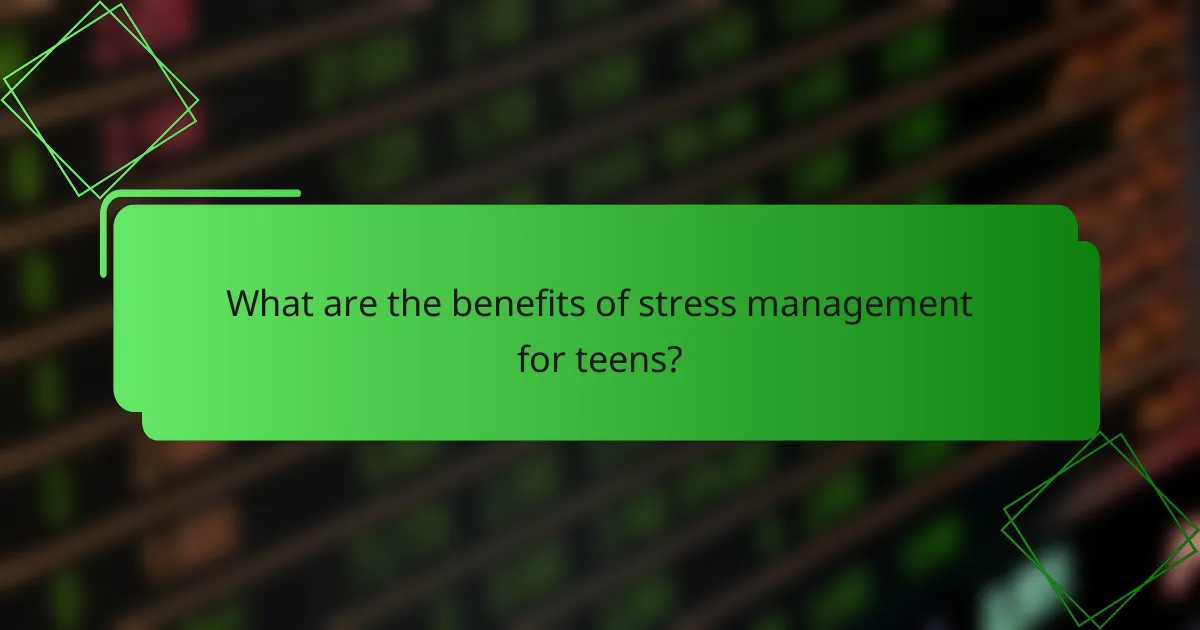
What are the benefits of stress management for teens?
Stress management is crucial for teens as it helps them cope with the pressures of adolescence, leading to healthier emotional and physical well-being. By learning to manage stress effectively, teens can enhance their overall quality of life and improve their ability to handle challenges.
Improved emotional regulation
Effective stress management techniques enable teens to better regulate their emotions. This means they can respond to situations with greater calmness and clarity, reducing instances of anxiety and mood swings. Techniques such as mindfulness and deep breathing can help teens pause and reflect before reacting.
Practicing emotional regulation can lead to stronger relationships with peers and family, as teens become more adept at communicating their feelings and understanding others. Encouraging regular check-ins about emotions can foster an environment where teens feel safe to express themselves.
Enhanced academic performance
Managing stress positively impacts academic performance by improving focus and concentration. When teens are less stressed, they can absorb information more effectively and retain what they learn. Techniques like time management and organized study habits can help reduce academic pressure.
Additionally, participating in stress-reducing activities, such as sports or arts, can provide a mental break that enhances creativity and problem-solving skills. Schools can support this by incorporating wellness programs that teach stress management strategies.
Better physical health
Stress management contributes to better physical health by reducing the risk of stress-related illnesses. Teens who manage stress effectively often experience fewer headaches, stomachaches, and sleep disturbances. Regular physical activity, a common stress reliever, can further boost their immune system and overall health.
Encouraging healthy habits, such as balanced nutrition and adequate sleep, is essential for teens. Simple practices like maintaining a consistent sleep schedule and engaging in regular exercise can significantly enhance their physical well-being and resilience against stress.
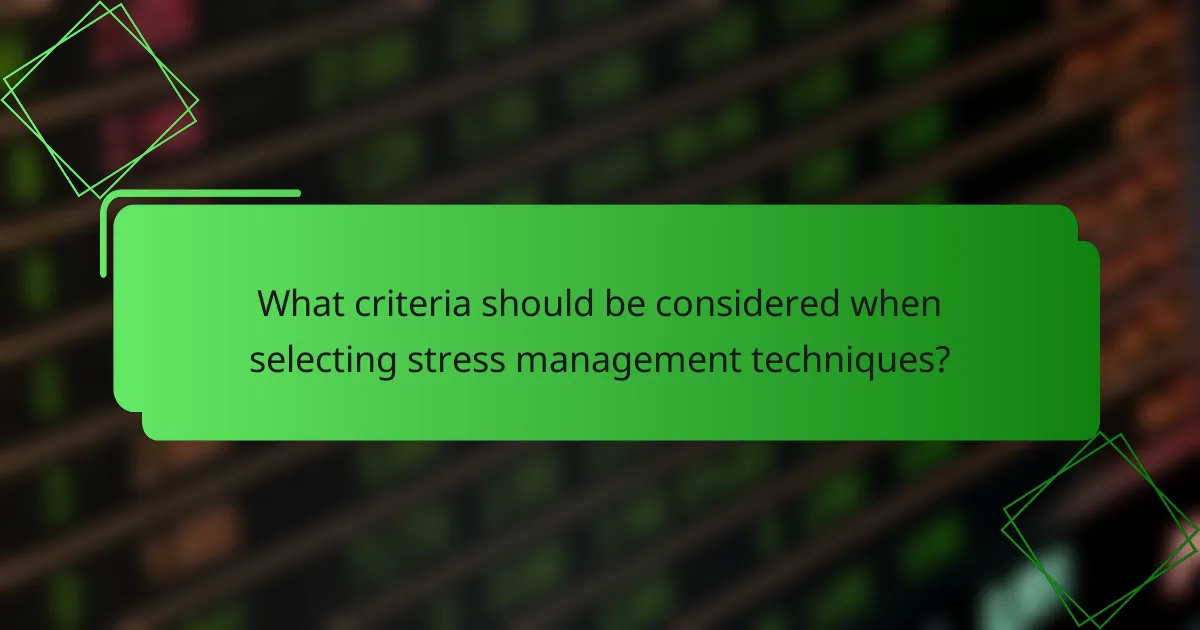
What criteria should be considered when selecting stress management techniques?
When selecting stress management techniques, it’s essential to consider personal preferences, the effectiveness of methods for specific stressors, and the accessibility of available resources. Tailoring techniques to individual needs can enhance their impact on overall wellness.
Personal preferences
Personal preferences play a crucial role in the effectiveness of stress management techniques. Individuals are more likely to engage with methods that resonate with their interests and lifestyles, whether it’s mindfulness, physical activity, or creative outlets. For example, a teen who enjoys music may find relief through playing an instrument or listening to calming playlists.
It’s beneficial to explore various options and reflect on which activities feel most comfortable and enjoyable. Keeping a journal to track feelings about different techniques can help identify the most effective strategies over time.
Effectiveness for specific stressors
Different stressors may require tailored approaches for effective management. For instance, academic pressure might be alleviated through time management techniques, while social anxiety could be addressed with exposure therapy or social skills training. Understanding the nature of the stressor can guide the selection of the most appropriate technique.
Consider using a combination of methods to address multiple stressors. For example, a teen facing both academic and social challenges might benefit from stress-relief activities like yoga, which promotes relaxation and focus.
Accessibility of resources
Accessibility of resources is a significant factor in choosing stress management techniques. Some methods, like deep breathing exercises or journaling, require minimal resources and can be practiced anywhere. Others, such as therapy or specialized classes, may involve costs or require transportation.
Evaluate local options, such as community centers or school programs that offer workshops on stress management. Online resources, including apps and websites, can also provide valuable tools that are easily accessible and often free, making them a practical choice for teens.
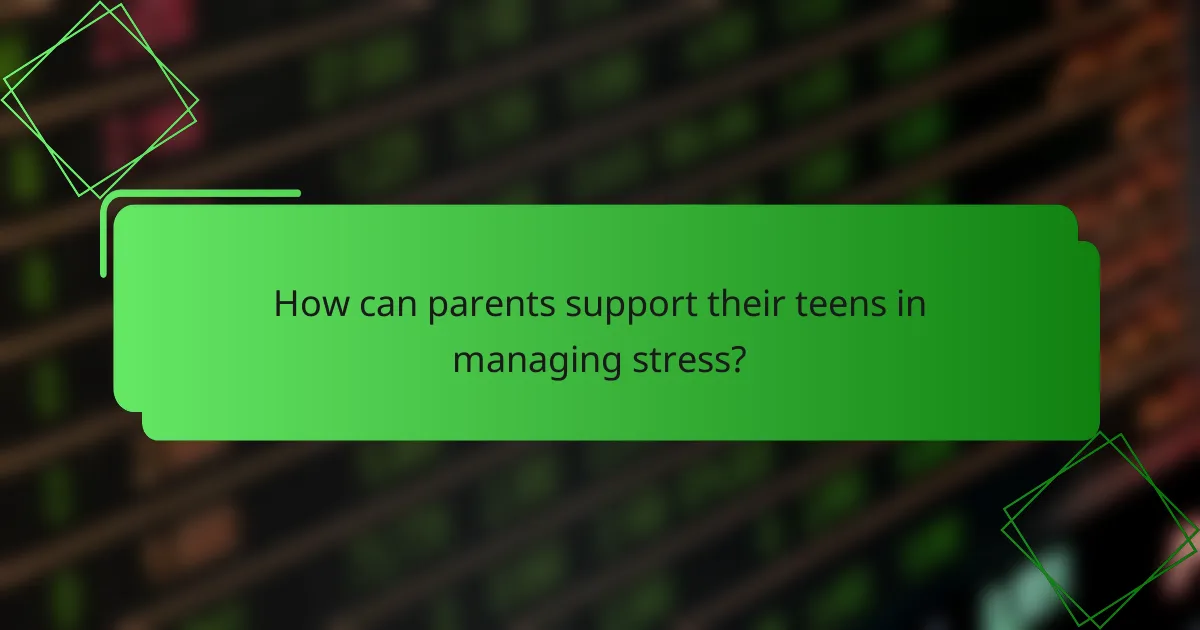
How can parents support their teens in managing stress?
Parents can play a crucial role in helping their teens manage stress by fostering a supportive environment and encouraging healthy coping strategies. By being proactive and engaged, parents can help their teens navigate the challenges of adolescence more effectively.
Open communication
Open communication is essential for parents to support their teens in managing stress. This involves creating a safe space where teens feel comfortable sharing their thoughts and feelings without fear of judgment. Regular check-ins can help parents stay informed about their teen’s emotional state and stressors.
To promote open dialogue, parents can ask open-ended questions and actively listen to their teen’s responses. For example, instead of asking, “Did you have a good day?” they might say, “What was the best and worst part of your day?” This encourages deeper conversations and helps teens express themselves more freely.
Additionally, parents should be mindful of their own reactions when teens share their concerns. Responding with empathy and understanding can strengthen the parent-teen relationship and encourage ongoing communication. Avoid dismissing their feelings, as this can lead to teens feeling isolated and reluctant to share in the future.
